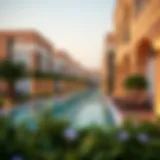Dubai in 2040: Insights into Future Developments
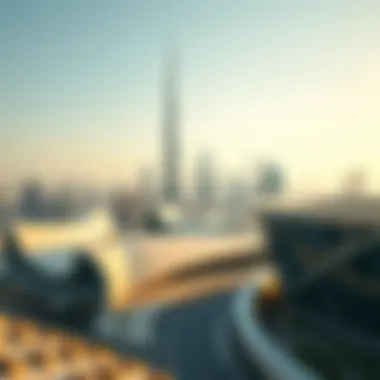
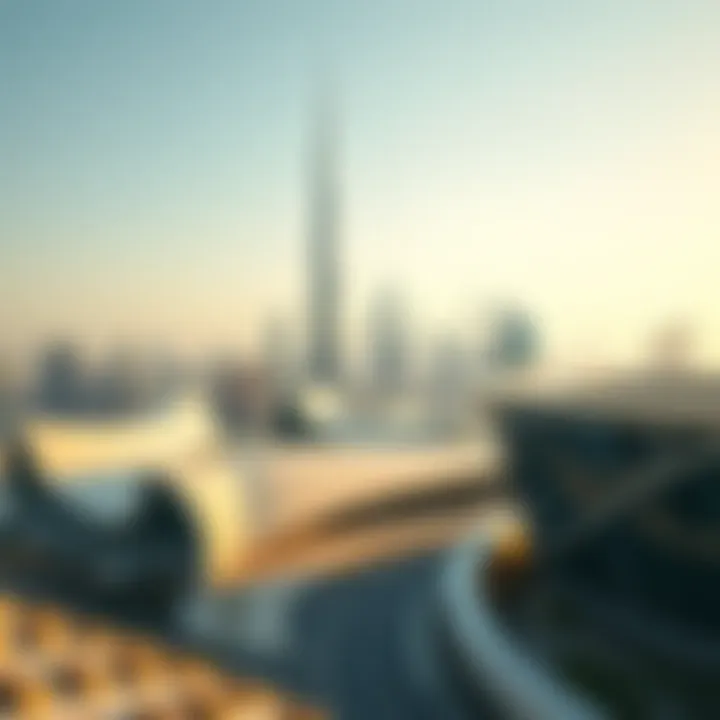
Intro
As the sands shift and the skyline evolves, Dubai stands at the brink of a transformative era. By 2040, the city is expected to leap further into its role as a global hub, intertwining innovative architecture with cutting-edge technology and rich cultural tapestry. The future landscape of Dubai isn't merely a fantasy; it is the cumulative result of strategic planning and relentless ambition. This article peels back the curtain on what's coming down the pipeline for investors, expatriates, and anyone intrigued by the dynamics of property and development in this desert marvel.
We will delve into various aspects shaping this modern oasis—from current market trends and socio-economic changes to the emerging technological sectors that will redefine urban living. For savvy investors and potential homeowners, the implications of these developments on property values and real estate strategies cannot be overstated. Understanding these shifts will provide future-proof insights into navigating the complex terrain of investing in Dubai's rapidly evolving market.
Foreword to Dubai's Vision
Dubai's Vision 2040 serves as a beacon for the city's future, signaling its bold aspirations and carefully crafted strategies aimed at not just growth, but sustainable development and livability. This section lays the groundwork for understanding how the leadership in Dubai is positioning the city in the global arena, suggesting a bright and bustling horizon. It is pivotal for investors, homebuyers, and other stakeholders to grasp these ambitions as they present a massive opportunity to align their interests with the city's trajectory.
Overview of Dubai's Growth Objectives
The growth objectives outlined in the Vision 2040 framework are multifaceted, addressing a range of elements from urbanization to tourism enhancement. The plan emphasizes the establishment of a comprehensive infrastructure capable of supporting an ever-growing population. Key goals include:
- Enhancing Urban Experiences: This involves increasing green spaces, public parks, and recreational facilities, inviting residents and visitors alike to engage more with their environment.
- Boosting Tourism: With an eye on becoming one of the top five global tourist destinations, Dubai aims to diversify its attractions, moving beyond glitzy mall culture to include cultural, historical, and adventure experiences that cater to myriad preferences.
- Sustainable Development: A clear commitment to sustainability is visible, as the city integrates eco-friendly practices into its urban planning. By promoting renewable energy projects and green building initiatives, Dubai aims to reduce its carbon footprint significantly. The objectives laid out here are not just theoretical; they signify actionable steps that will guide investment strategies and residential development in the coming decades. As Dubai continues to redefine its economic landscape, keeping a close eye on these growth objectives is essential for anyone considering a stake in this vibrant market.
Strategic Planning Framework
The strategic planning framework underpinning Dubai's Vision 2040 is a testament to meticulous foresight and strategic thinking. It provides a roadmap that balances immediate needs with long-term sustainability. Here are several elements that stand at the core of this framework:
- Public-Private Partnerships: Collaboration between government entities and private organizations will be key. This synergy is designed to foster innovation and expedite project delivery, making for more efficient use of resources.
- Integrated Transport Systems: The framework includes ambitious plans for enhancing transport infrastructure, promoting systems that are efficient, affordable, and environmentally friendly. High-tech transport solutions are expected to ease congestion and improve connectivity within the city.
- Community Involvement: Engaging with residents in the planning process not only encourages community ownership but also ensures that developments truly reflect the needs and desires of the people who call Dubai home. Dubai’s strategic framework isn’t merely about bricks and mortar; it represents a holistic pursuit of an inclusive environment that prioritizes its residents, thereby ensuring that the growth is sustainable and meaningful. Investors and homebuyers looking to navigate this evolving landscape would benefit greatly from understanding how these strategic elements will manifest in real estate opportunities.
"Vision 2040 is not just a government initiative; it’s a call for participation from every sector of society, fueling a collective ambition to shape our future."
In sum, the introduction sets the stage for a comprehensive exploration of what lies ahead for Dubai by 2040. Engaging with this vision creates a solid foundation as we look deeper into urban development initiatives, technological advancements, and the area’s socio-economic changes. Each aspect feeds into the larger narrative of a city poised to lead the future.
Urban Development Initiatives
The rapid growth of Dubai has increasingly caught the eyes of investors, corporations, and global expats. By 2040, the city's urban development initiatives stand at the forefront of its transformation. These initiatives not only reflect the ambitions of its government but also underscore the commitment to creating a sustainable and vibrant urban environment. This section illustrates the significance of urban development in shaping Dubai’s future, detailing major infrastructure projects and embracing smart city concepts that aim to streamline urban life.
Major Infrastructure Projects
Dubai's skyline is a testament to its incredible infrastructure developments, which serve as the backbone of its urban landscape. These major projects are pivotal as they lay the groundwork for the city's vision for an integrated, accessible, and efficient environment.
First off, the expansion of the Dubai Metro system is crucial. The plan includes extending existing lines and even introducing autonomous trains. By enhancing connectivity, residents and visitors can expect smoother travels that are both timely and reliable, which enhances the overall living experience.
Moreover, the Dubai Airport expansion is on the horizon, aiming to increase capacity and cater to the ever-growing passenger demand. A larger airport means more international travelers and a boost to the economy, pulling in investments and tourism alike.
The new Aladdin City, a massive development echoing the tales of old, will also be crucial. Setting aside its enchanting theme, it features a blend of residential spaces, hotels, and offices. These projects allow for an economic ripple effect, as they create jobs and expand the commercial sector significantly.
“Dubai's infrastructure projects not only redefine its landscape but also reimagine how residents interact with their city, merging tradition and innovation.”
Smart City Concepts
The advancements towards becoming a smart city in 2040 show how Dubai is embracing technology to enhance urban livability. Smart city concepts focus on integrating electronic data and systems to manage resources efficiently. The goal? To improve city services, sustainability, and ultimately, the quality of life for residents and visitors.
A prime example is the incorporation of Internet of Things (IoT) technology. In daily life, this means that traffic systems will adjust to real-time flows, air quality will be monitored to ensure a cleaner environment, and energy consumption will be optimized through intelligent systems.
Additionally, Dubai is looking seriously at smart waste management, employing sensors that notify collection services when bins are full. This simple yet effective application not only reduces waste collection costs but also contributes to the city's cleanliness and sustainability initiatives.
Furthermore, the city is experimenting with blockchain technology to manage everything from property transactions to public records. This promise of transparency and efficiency can potentially reshape trust in urban governance, making it appealing for investors and residents.
In summary, Dubai's urban development initiatives are more than just projects; they represent a comprehensive planning approach that acknowledges the need for an adaptable infrastructure. As Dubai continues to innovate, it's poised to become a benchmark for urban development in the 21st century, capturing the attention of those seeking opportunities in real estate and beyond.
Technological Advancements
The spotlight on Dubai's future cannot be dimmed, especially when it comes to technological advancements. By 2040, the residents and investors in Dubai can expect a distinctive landscape shaped by cutting-edge innovations. Technology is considered the backbone of progressive urban development. For Dubai, this means a smarter, more efficient, and an interconnected city structure. The integration of advanced technologies will not only affect how inhabitants engage with their environment but also serve as a catalyst for further economic growth and opportunities.
Integration of AI and Automation


Artificial Intelligence is revolutionizing various industries, and Dubai is not one to lag behind. The integration of AI and automation within the urban space aims to enhance productivity, reduce costs, and improve the quality of services provided to residents. Various sectors—from health care to transport—are adopting AI technologies to optimize operations significantly.
Even the real estate market will feel the ripple effects of AI. Investors can expect tools that predict property values with remarkable accuracy. These tools analyze a multitude of factors, including market trends, economic shifts, and community developments. Hence, landlords can make better-informed decisions regarding their properties, whether in terms of pricing or choosing renovations that can yield higher returns.
Moreover, the introduction of automated systems in housing management will simplify tasks that were once cumbersome. Smart home technologies will become more mainstream, allowing residents to remotely control their environments—be it adjusting thermostats, managing security systems, or monitoring energy consumption.
"In a city known for its ambition, aligning with AI validates Dubai’s mission to become a global hub for innovation."
Impact of Blockchain on Real Estate
Blockchain technology is another game changer on the horizon. While many relate blockchain predominantly with cryptocurrencies, its applications extend far beyond. In the context of real estate, blockchain is set to emerge as a powerful tool for transparency and efficiency.
Dubai's property sector may leverage blockchain to streamline transactions, cutting down on the long processes that often cause delays. With smart contracts on this decentralized platform, deals can be executed instantly and securely. This means buyers and sellers can finalize agreements without the need for intermediaries, thus reducing associated costs significantly.
Furthermore, having a transparent ledger helps in combating fraud. When every transaction is recorded on a public blockchain, it's easier to trace property history. Investors will feel more secure knowing they can verify the authenticity of titles and ownership history at any moment. In this way, blockchain serves not only to bolster confidence but can also attract more investors who may have hesitated due to fear of fraud prevalent in traditional transactions.
The combination of AI and blockchain technology lays the groundwork for a more reliable and streamlined interaction within Dubai's real estate market. Such advancements are not just consequential; they are transformative—ensuring that the city remains at the forefront of global innovation by 2040.
Socio-Economic Changes
The landscape of Dubai, as we step into 2040, is poised to witness significant socio-economic transformations. Understanding these changes isn't just an academic exercise; it's crucial for investors, homebuyers, and expatriates who are looking to stake their claim in this rapidly evolving oasis. The symbiotic relationship between demographics, migration, and economic strategies will shape the fabric of the city.
Demographic Shifts and Migration Patterns
Demographic shifts are pivotal in discerning the future of Dubai. The city has long been a melting pot of cultures, drawing people from various corners of the globe. As we approach 2040, the resident population is expected to diversify further, with a notable increase in the number of skilled professionals migrating for work and lifestyle enhancement. This influx is largely driven by the burgeoning technology sector and the quest for a cosmopolitan lifestyle.
Key factors influencing these demographic changes include:
- Job Opportunities: Enhanced sectors, including tech and biotech, are drawing a younger, ambitious workforce.
- Quality of Life: World-class amenities and a rich cultural tapestry make Dubai an attractive stop.
- Family Migration: Many foreigners are relocating with their families, creating a stable, long-term resident base.
This demographic shift not only affects the workforce but also influences consumer behavior. A more diverse population leads to varying preferences in housing, shopping, and services. Consequently, property developers and investors must stay sharp and adaptable to these changing demands.
Economic Diversification Strategies
The old adage "don't put all your eggs in one basket" rings particularly true for Dubai’s economic landscape as it navigates the future. Recognizing the volatility of oil dependency, the emirate has laid out a road map for diversification that extends to technology, tourism, and renewable energy. To bolster economic resilience, the strategies include:
- Investment in Innovation: Fostering a startup ecosystem through incubators and funding support that nurtures local talent.
- Tourism Diversification: Beyond luxury tourism, promoting heritage sites and eco-tourism to attract a broader audience.
- Sustainability Initiatives: Emphasizing green jobs and sustainable practices to meet global standards while ensuring long-term viability.
"A diversified economy is like a well-prepared meal; it needs a variety of ingredients to be satisfying and nutritious."
As these economic strategies take root, the implications will be profound on the real estate market. Areas previously overlooked may now become hotspots due to these transformative policies. Investors should keep a keen eye on districts aligning with growth sectors.
In summary, as demographic patterns shift and economic strategies evolve, Dubai stands at the brink of a vibrant future. Grasping these socio-economic changes will not just aid current stakeholders but also pave the way for new entrants seeking to thrive in this dynamic milieu.
Environmental Sustainability Goals
As Dubai thunders towards 2040, the conversation around environmental sustainability is not just a footnote—it's central to its ambitious vision. The desert city, known for its opulence, has to strike a balance between growth and green initiatives. Understanding these sustainability goals becomes essential for investors and homebuyers who want their endeavors aligned with the future.
The burning question is: why focus on sustainability? Well, it's about ensuring that the stunning skylines of tomorrow don’t come at the cost of our planet. For investors and developers alike, sustainable practices not only help in preserving the environment but can also lead to significant cost savings. As resources dwindle and demand rises, those who adopt these practices early could find themselves ahead of the curve.
Green Building Practices
A key aspect of sustainability in Dubai's future is green building practices. The city is already laying the groundwork with innovative architectural designs that respect the environment. Buildings are designed not only to look futuristic but also to be energy-efficient. Features such as smart glass and green roofs are just the tip of the iceberg.
The government has put forth regulations to ensure that new constructions include sustainable elements such as water-saving fixtures, solar panels, and wind turbines. By creating an environment that's conducive to sustainable architectures, like those seen at the Dubai Sustainable City, the government is sending a clear message: sustainability and luxury can go hand in hand.
Investors should take heed; properties built with eco-friendly practices are likely to draw a premium price. It’s not just about being trendy. The growing consciousness among buyers, particularly expatriates, favors properties that contribute to a greener future. When it comes to listings, homes that flaunt sustainable features will likely catch the attention of a discerning clientele who prioritize ecological considerations alongside comfort and aesthetics.
Renewable Energy Projects
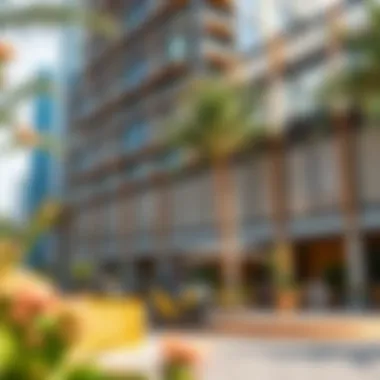
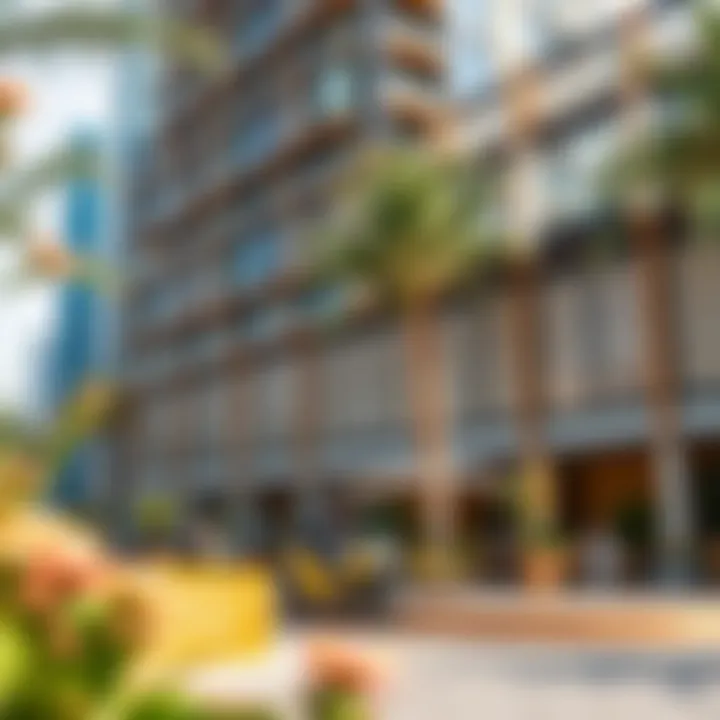
Next on the horizon are renewable energy projects that promise to transform Dubai’s energy landscape. The UAE has invested heavily in solar energy, making it a cornerstone of its sustainability goals. Projects like the Mohammed bin Rashid Al Maktoum Solar Park are leading the charge, aiming to generate thousands of megawatts of clean energy by 2040.
This focus on renewables means that upcoming developments will have a significant reduction in their carbon footprint. Developers who include energy-efficient systems in their properties, such as photovoltaics or geothermal heating, can provide long-term savings for residents and businesses. They are not merely investments in a property but rather investments in a lifestyle that prioritizes sustainability.
Moreover, embracing renewable energy isn’t just a government mandate; it has become a societal shift. As expatriates from around the globe move into Dubai, many come with voices demanding sustainability. These potential buyers will have expectations about eco-friendly living, and builders focusing on renewable energy solutions will see an increase in demand.
"The future is not a gift; it is an achievement. Equal to the work and the sacrifice of the whole present generation, and the greater that generation, the greater the achievement."
This ethos not only applies to cities like Dubai but is reflective of every tenant in the economy—from energy costs to property values. For investors, understanding and aligning with these trends is vital. They must prepare for a new age where sustainability isn't just a buzzword but a fundamental aspect of life in Dubai by 2040.
Real Estate Market Implications
The future of Dubai’s real estate market is intricately linked to the city’s development aims and socio-economic strategies set for 2040. Understanding this landscape is crucial not just for investors but also for buyers, agents, and developers. As the city undergoes significant transformations, the implications for the real estate sector will be profound, encompassing shifts in property values and the emergence of new neighborhoods.
As one considers investment in Dubai’s real estate scene, it’s important to keep a few key elements in mind:
- Inclusivity of Diverse Investments: With an emphasis on attracting global investors, the diversification of investment opportunities becomes paramount. Many potential buyers might find niche markets that cater to specific demographics.
- Policies Affecting Property Rights: Changes in the regulatory frameworks that govern properties can significantly impact property values. Understanding how these laws evolve will be vital.
- Urbanization Trends: The steady influx of expatriates and new residents will shape demand for various real estate types, from luxury apartments to affordable housing.
The compressive exploration of these dynamics not only highlights the importance of staying informed but also emphasizes the benefits tied to perceptive investment strategies.
Projected Property Value Trends
Analyzing the projected property value trends in Dubai by 2040 provides critical insights for anyone looking to dive into the market. With ambitious developments unfolding, certain areas are expected to shine brighter than others. Here are several noteworthy factors influencing these trends:
- Demand Surge in Emerging Suburbs: As major infrastructure projects complete, expect rising demand in suburbs that cater to families. Areas like Dubai South and Dubai Creek Harbour might see property values soar as amenities and connections improve.
- Urban Revitalization Efforts: Legacy neighborhoods undergoing substantial renovations will likely attract higher value properties. Investing in rejuvenated districts could yield profitable returns.
- Technological Integration in Real Estate: The impact of smart home technology and AI on property listings is creating an environment ripe for value increases. Properties equipped with these features cater to a tech-savvy demographic.
This predictive narrative of value movements serves as a guiding beacon for real estate stakeholders.
Emergence of New Neighborhoods
The emergence of new neighborhoods in Dubai by 2040 encapsulates the city’s ambitions for expansion and modernization. As urban planners prioritize sustainability and community well-being, several nascent neighborhoods are set to flourish:
- Sustainable Communities: Emerging areas focused on eco-friendly living, such as Dubai Hills Estate and Al Qudra, are likely to witness significant interest. Developers are keen to capitalize on environmentally conscious projects, driving demand.
- Smart Districts: Developments such as the Dubai Smart City reflect a shift toward integrated technology in daily life. These neighborhoods will attract those wishing to embrace a modern lifestyle, serving both residents and businesses.
- Cultural Hubs: Neighborhoods aimed at fostering cultural exchanges and interactions will also gain traction. With the presence of international schools, art centers, and dining options from global cuisines, these areas will attract diverse populations.
Understanding the currents behind new neighborhood developments allows investors to pinpoint where the next hotspot may arise and capitalize early on those opportunities.
"Investment is about observing the change in cities like Dubai and responding with foresight. Being in the right place at the right time is only part of the equation."
The implications of the real estate market leading into 2040 will undoubtedly shape the way Dubai is perceived as an attractive destination for living and investing, constantly evolving as it goes.
Investment Opportunities Ahead
As we look toward 2040, the potential for investment opportunities in Dubai cannot be overstated. Investors, both seasoned and newcomers, stand to benefit from a wealth of developments and shifts within the city's economic landscape. This is not just about chucking money into properties; it’s about strategizing and understanding which sectors are set to boom and how to mitigate risks effectively. The implications of these changes will echo through the real estate and investment sphere for years to come.
Sectoral Investment Trends
To navigate through the opportunities, it is crucial to identify which sectors are projected to thrive in the coming years. In Dubai, certain industries are already being earmarked for substantial growth:
- Hospitality and Tourism: With global travel on the rise, Dubai remains a hotspot. New hotels, resorts, and attractions are under construction or in planning stages, poised to bring in more tourists. This translates to increased demand for short-term rentals and related services.
- Technology and Startups: The tech scene is buzzing, influenced by the government's emphasis on innovation and entrepreneurship. Sectors such as fintech, health tech, and e-commerce are exhibiting robust growth, presenting attractive channels for investment.
- Renewable Energy: With an increasing focus on sustainability, investments directed toward solar and other renewable energies are expected to flourish. This transition is not only environmentally forward-thinking but also economically beneficial, tapping into a growing market that's hard to ignore.
- Retail: Despite the rise of e-commerce, well-located retail spaces continue to draw in investors. Malls and community-focused shopping areas that blend leisure with shopping experiences are set to thrive as footfall increases.
Investors must remain vigilant, tracking these sectoral trends. Understanding market demands and aligning investments accordingly can lead to fruitful returns.
Risks and Challenges for Investors
While the future looks promising, no investment is without its complexities. As one weighs options, consideration of potential pitfalls is essential:
- Market Volatility: Property markets might experience fluctuations. An economic downturn or changes in global investment trends can affect property values, hence, understanding market dynamics is a necessity.
- Regulatory Changes: The regulatory environment around property investments in Dubai has undergone significant changes in recent years. Navigating these can be tricky, and failure to keep abreast of new laws and policies could lead to missteps.
- Financing Challenges: Acquiring funding may present hurdles. With fluctuations in interest rates globally, securing financing for investments can become a gamble.
- Cultural Sensitivity: In a multicultural city like Dubai, maintaining awareness of local customs and norms is vital. Any misalignment can negatively impact tenant relationships or business operations.
“Being proactive is a must. Engage with local experts to gain insights and minimize risks.”
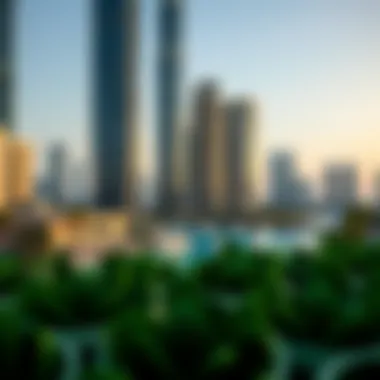
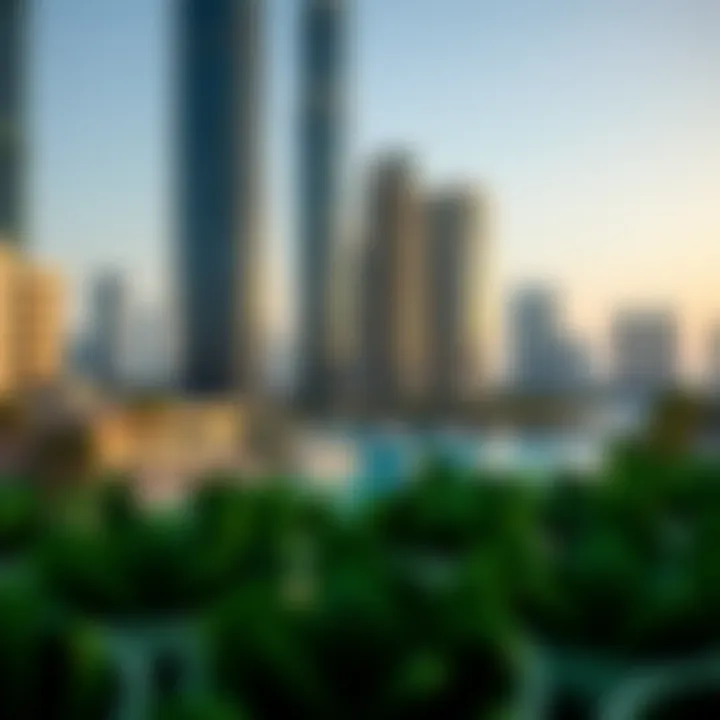
Regulatory Environment in
As Dubai looks to the future, the regulatory environment plays a crucial role in shaping its growth and development. The landscape of property laws and government policies will significantly influence both local and foreign investments. An understanding of this regulatory framework is essential for homebuyers, property investors, and real estate agents. With anticipated changes on the horizon, stakeholders must navigate these complexities to make informed decisions.
Changes in Property Laws
By 2040, it's expected that Dubai will refine its property laws to create an even more favorable atmosphere for investment. Significant shifts may include:
- Streamlined Ownership Regulations: Simplifying ownership structures, especially for expatriates, could become a focal point. Current laws allow foreign ownership in designated freehold areas; future laws might expand these zones, further entrenching foreign investor confidence.
- Tenancy Rights Enhancement: With an increasing expatriate population, there’s a strong likelihood that tenancy rights will see comprehensive reforms. Stronger protections for tenants, such as clearer terms and enhanced dispute resolution mechanisms, would attract long-term residents.
- Increased Transparency in Transactions: A move toward transparency will likely be prioritized. This might involve the introduction of real-time data access on property values and transaction histories, making it easier for buyers to evaluate their options.
The smooth sailing for real estate hinges on understanding these laws.
Impact of Government Policies
Government policies will lay the groundwork for Dubai’s standing as a global business hub by 2040. Several expected policies could reshape the business ecosystem:
- Fiscal Incentives for Sustainable Development: Policies aimed at promoting green buildings and sustainable development will likely become more prevalent. This commitment could result in financial incentives for investors who comply with environmental regulations, ensuring David’s greener future.
- Support for Innovation and Tech Startups: The government may broaden its support for innovation sectors. With the rise of fintech and proptech, potential grants or tax exemptions will encourage investments in technology-driven real estate solutions.
- Regulatory Sandbox Frameworks: The creation of regulatory sandboxes, allowing for experimentation with new real estate models and practices, could provide a safe space for developers to innovate.
“Understanding the regulatory landscape is just as important as assessing market trends; the two go hand in hand.”
Navigating these regulatory changes will require diligence and a well-informed approach. Stakeholders who stay ahead of the curve, adapting to the evolving landscape, will be better positioned to leverage the opportunities that arise as Dubai progresses toward 2040.
Cultural and Lifestyle Evolution
Cultural and lifestyle evolution plays a pivotal role in shaping the future landscape of Dubai. As the city transitions towards 2040, the blending of diverse cultures, lifestyles, and social dynamics will take center stage. Understanding these transformations is crucial for both investors and expatriates who seek to navigate the changing environment. Dubai's multicultural charm has always attracted people from various backgrounds, but the next two decades will bring a fresh wave of global influences, amplifying its status as a crossroads of cultures.
Influence of Global Culture
The impact of global culture in Dubai is significant as it shapes the city's identity and social fabric. With the rise of instant communication and the internet, cultural exchanges are rapid and frequent. The infusion of varied cultural elements—from cuisine and fashion to art and entertainment—will continue to redefine the local landscape. Here are some notable aspects to consider:
- Culinary Innovations: International restaurants and food festivals celebrating global cuisines will flourish. Expect to see Michelin-star restaurants sprout up alongside traditional Emirati eateries, creating a dynamic food scene.
- Art and Entertainment Diversity: An influx of global artists and performers will reshape the creative scene. Art galleries and theaters will showcase both local talent and international works, resulting in eclectic events that cater to diverse tastes.
- Cultural Festivals: Expect more multicultural festivals highlighting heritage, dance, music, and traditions from around the world. These events foster a spirit of inclusion and community, encouraging dialogue among residents.
This cultural melting pot not only enhances Dubai's global appeal but also serves as a catalyst for social cohesion among its residents.
Evolution of Expatriate Communities
The evolution of expatriate communities in Dubai reflects the changing demographics and social dynamics of the city. With expatriates making up a significant portion of the population, their influence on lifestyle and culture is profound. As Dubai builds towards its ambitious future, several trends are anticipated:
- Cohesion in Diversity: Expat communities will grow and evolve, often forming networks based on national, linguistic, or cultural lines. This cohesion can lead to vibrant neighborhood identities while fostering a unified city experience.
- Local Integration: As expatriates become more settled, there will be a shift towards greater integration with local customs and traditions. This can lead to more intercultural interactions and partnerships, enriching the overall fabric of Dubai society.
- Increased Community Centers: To cater to the needs of diverse groups, expect the rise of community centers offering programs tailored to expatriate populations. These centers could provide language courses, cultural exchange events, and more opportunities for networking.
In summary, the evolution of expatriate communities not only contributes to the richness of Dubai's cultural landscape but also poses opportunities for collaboration and engagement among various cultural groups. As these trends unfold, they will undoubtedly impact everything from real estate demand to lifestyle choices in the coming years.
“Dubai, with its unique blend of cultures, offers a distinct advantage as a global city, enticing residents and investors to embrace its vibrant future.” - Expert Commentary
Preparing for the Future
As Dubai races toward its Vision 2040, understanding the preparatory steps that both homebuyers and investors need to undertake becomes paramount. This section aims to shed light on how individuals and businesses can best position themselves in the face of impending changes. The future holds great promise and potential, but without careful planning, it can also present unanticipated challenges. Therefore, what should one know to thrive in this dynamic market?
Strategies for Homebuyers
Homebuyers need to develop a savvy approach as they navigate the evolving landscape of Dubai. Key factors to consider include:
- Market Research: Familiarize yourself with emerging neighborhoods and their projected growth. For instance, areas like Dubai Creek Harbour may see significant developments in mixed-use projects, appealing to those looking for modern living amidst nature.
- Affordability: With property prices fluctuating, it's wise to keep a diligent eye on market trends. Have a budget in place and don't just rely on current mortgage rates; instead, consider historical patterns and make informed decisions on timing.
- Proximity to Infrastructure: The shift towards smart city initiatives means that properties within easy reach of transport links and public services will not only add value but improve the quality of life.
- Legal Considerations: Understanding the legal nuances of property ownership in Dubai is critical. The system may seem straightforward, but there are layers of regulations that can impact your rights as a homeowner.
For instance, being aware of leasehold versus freehold options can inform your long-term investment.
"In real estate, location isn’t just about where you're at; it’s about where you’re going."
Overall, homebuyers are advised to take time to align their expectations with market realities and shift their focus toward future-proofing their investment rather than just immediate gratification.
Guidelines for Investors
Investors looking at Dubai's property market in 2040 must adopt a forward-thinking perspective. Key recommendations include:
- Long-Term Vision: The mindset should shift from instant returns to sustainable growth. Investments could yield substantial rewards as the city implements its ambitious development plans.
- Diverse Portfolio: Mitigating risks through diversification is crucial. Consider investing across various sectors, such as commercial spaces, residential units, and hospitality, each with its unique dynamics.
- Technology Integration: Stay abreast of tech advancements that can enhance property management and investment decision-making. For example, virtual tours and blockchain technology can help streamline transactions.
- Networking: Engaging with local experts, attending property expos, and joining investment groups facilitates insights into market trends and best practices. Establishing solid relationships within the community can be invaluable.
- Stay Informed on Regulations: Changes in governmental policies can affect investment landscapes. Regularly consult resources like the Dubai Land Department for updates on property laws and regulations.
By honing these strategies, investors can seize opportunities while navigating the complexities of the real estate market in Dubai. The year 2040 is not just a distant vision; it is an evolving reality that calls for preparedness and adaptability.


